Filter by
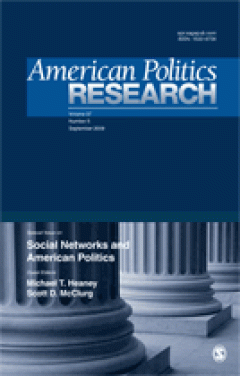
Trait Voting in U.S. Senate Elections
Assessments of candidates’ personal attributes are known to affect vote choice in presidential elections, but little work has explored trait perceptions and trait voting in congressional contests. In this article, I examine the role of candidate traits in U.S. Senate campaigns, drawing on unique survey data from the 2006 midterms. I find that voters’ evaluations of candidate qualities are less …
- Edition
- Vol. 38 no. 6, November 2010.pp. 1102-1129
- ISBN/ISSN
- 1532673x
- Collation
- -
- Series Title
- American Politics Research
- Call Number
- -

Who or What Governs?: The Effects of Economics, Politics, Institutions, and N…
The core question driving the study of local politics is—who or what governs local democracy? After decades of study, researchers continue to debate the relative merits of economic, political, institutional, and bureaucratic accounts of local democracy. By providing a test that incorporates each of these four different theoretical perspectives, that analyzes major spending decisions that cities…
- Edition
- Vol. 38 no. 6. November 2010.pp. 1130-1163
- ISBN/ISSN
- 1532673x
- Collation
- -
- Series Title
- American Politics Research
- Call Number
- -
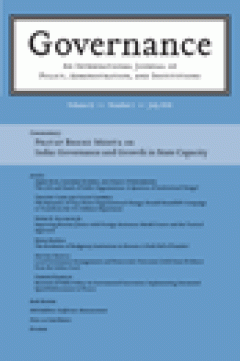
More Open but Not More Trusted? The Effect of the Freedom of Information Act …
This article examines the impact of Britain's Freedom of Information (FOI) Act 2000 on British central government. The article identifies six objectives for FOI in the United Kingdom and then examines to what extent FOI has met them, briefly comparing the United Kingdom with similar legislation in Ireland, New Zealand, Australia, and Canada. It concludes that FOI has achieved the core objective…
- Edition
- Volume 23, Issue 4, pages 561–582, October 2010
- ISBN/ISSN
- 09521895
- Collation
- -
- Series Title
- Governance
- Call Number
- -

The Aversion to Direct Cost Imposition: Selecting Climate Policy Tools in the…
Numerous policy tools could be employed in attempting to mitigate climate change through reducing greenhouse gas emissions. Direct cost imposition through the taxation of carbon content of fossil fuels has long enjoyed support from diverse policy analysts but has proven highly difficult to advance politically in the United States and many other nations. This article considers the evolving Ameri…
- Edition
- Volume 23, Issue 4, October 2010, pages 583–608
- ISBN/ISSN
- 09521895
- Collation
- -
- Series Title
- Governance
- Call Number
- -

Implementing Fiscal Decentralization: A Case Study of a Regional Tax Agency i…
As a measure to enhance the fiscal autonomy of the region, in 2006 the Regional Government of Sardinia in Italy decided to establish a tax agency for managing regional taxes on holiday houses and boat and aircraft transit. Based on interviews conducted with the tax agency director and staff, this article traces the trajectory and outcome of events included in the implementation of this part of …
- Edition
- Volume 23, Issue 4, pages 609–621, October 2010
- ISBN/ISSN
- 09521895
- Collation
- -
- Series Title
- Governance
- Call Number
- -

Dysfunctional Policy Transfer in National Tax Blacklists
Common sense and much of the policy transfer literature suggests that learning from abroad delivers better policy at lower cost. In contrast, this article argues that policy transfer in tax blacklists has been a dysfunctional process tending to replicate errors. Rather than reflecting learning, normative mimicry, or market pressures, over-committed policymakers have responded to complexity and …
- Edition
- Volume 23, Issue 4, pages 623–639, October 2010
- ISBN/ISSN
- 09521895
- Collation
- -
- Series Title
- Governance
- Call Number
- -

Policymaking in Multiparty Presidential Regimes: A Comparison between Brazil …
This paper explores why two countries with similar electoral, partisan, and presidential institutions, have produced significantly different policy outcomes in Latin America. Brazil and Ecuador are conventionally known as having highly fragmented party systems, where legislators have great incentives to cultivate a personal vote. Presidents are perceived to be strong and to make large use of go…
- Edition
- Volume 23, Issue 4, pages 641–666, October 2010
- ISBN/ISSN
- 09521895
- Collation
- -
- Series Title
- Governance
- Call Number
- -

Revising Road Safety Policy: The Role of Systematic Evidence in Switzerland
In recent years, interest has grown in promoting and employing “evidence-based policymaking.” This has been accompanied by an increase in available information about the performance of public policies. While existing research concludes that evidence about “what works” rarely prevails in democratic politics, it is inconclusive about which conditions affect the relevance of such evidence in decis…
- Edition
- Volume 23, Issue 4, October 2010. pages 667–690
- ISBN/ISSN
- 09521895
- Collation
- -
- Series Title
- Governance
- Call Number
- -
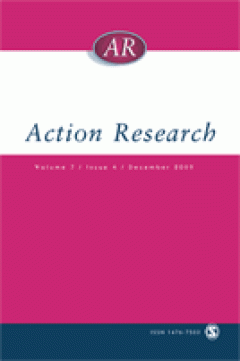
An action research approach to the inclusion of immigrants in work life and l…
Recent increases in the immigrant population in Norway have raised the issue of immigrant inclusion in the Norwegian society. The political emphasis has been on welfare, education and health for many decades. However, today the increasing shortage of labor in the market has raised the issue of inclusion of the immigrant population in work life. This article documents a 3-year-long action resear…
- Edition
- Vol. 8 no. 3, September 2010, pp. 237-265
- ISBN/ISSN
- 14767503
- Collation
- -
- Series Title
- Action Research
- Call Number
- -

Toward a reframing of action research for human resource and organization dev…
We propose a framework for viewing action research (AR) by considering the level of criticality and the emphasis on methodological process. Specifically, we propose conventional AR, critical AR, and dialogic AR as three broad categories for considering AR. This framework is explored through discussing the philosophical foundations upon which these approaches rest and providing examples of AR st…
- Edition
- Vol. 8 no. 3, September 2010.pp. 267-292
- ISBN/ISSN
- 14767503
- Collation
- -
- Series Title
- Action Research
- Call Number
- -

Constructing interorganizational collaboration: The action researcher as boun…
This article aims to explore critically the role of an action research team in the social construction of interorganizational collaboration aimed at transgressing organizational and professional boundaries. We argue that the new relationships, actor conceptions and in some cases forms of work organization arising from the change process have been socially constructed through the discursive inte…
- Edition
- Vol. 8 no. 3, September 2010.pp. 293-314
- ISBN/ISSN
- 14767503
- Collation
- -
- Series Title
- Action Research
- Call Number
- -

Action research as a sustainable endeavor for teachers: Does initial training…
Action research has been recognized as a necessary part of teacher preparation programs. It is assumed that with sufficient training in action research methodology, teachers will continue as action researchers to improve the quality of instruction in their classrooms. Expecting this benefit and outcome, a college in the Middle East requires students to complete one total semester of action rese…
- Edition
- Vol. 8 no. 3, September 2010.pp. 315-332
- ISBN/ISSN
- 14767503
- Collation
- -
- Series Title
- Action Research
- Call Number
- -

Using action research to challenge stereotypes: A case study of boys’ educa…
Action research has a long history of focus on social justice. This article examines such a project, a grant-funded action research project in Australia designed for a group of 14 teachers to study boys’ writing and their attitudes about writing. I argue that action research was a crucial methodology to help the participating teachers frame boys’ education issues as nuanced and complex from the…
- Edition
- Vol. 8 no. 3, September 2010.pp. 333-356
- ISBN/ISSN
- 14767503
- Collation
- -
- Series Title
- Action Research
- Call Number
- -

Learning Vicariously From Failure: The Case of Major League Soccer and the Co…
Organizations are often encouraged to learn from the failures of others. However, failures can be extremely complicated and multifaceted, defying clear cause attribution. Learning organizations face challenges in adopting and implementing the lessons of such failures and many times are unable to appropriately correct the root causes. Using a grounded theory approach, the authors present a learn…
- Edition
- Vol. 35 no. 5, October 2010.pp. 542-571
- ISBN/ISSN
- 10596011
- Collation
- -
- Series Title
- Group Organization Management
- Call Number
- -

Policy and Practice: Recursive Learning From Crisis
Data from the 2007 U.K. floods are examined using institutional theory and practice theory lenses. We note that learning from crisis ultimately results in “lessons learned” being institutionalized in new norms, tools, and infrastructure. As the basis of legitimate action for coping in the future, they may provide a measure of resilience, but crisis management and recovery is an active and emerg…
- Edition
- Vol. 35 no. 5, October 2010.pp. 572-605
- ISBN/ISSN
- 10596011
- Collation
- -
- Series Title
- Group Organization Management
- Call Number
- -

Why Do Product-Market Strategies Fail? A Sociostructural Examination Under Co…
The authors contend that structural and managerial antecedents of strategy failure exist and the extent to which these determine failure is different under conditions of high and low adherence to strategy. Our results support these arguments and demonstrate that the drivers of failure differ according to the unusual strategy process environment of both types of firms. Resource scarcity is found…
- Edition
- Vol. 35 no. 5, October 2010.pp. 606-635
- ISBN/ISSN
- 10596011
- Collation
- -
- Series Title
- Group Organization Management
- Call Number
- -

The Protracted Collapse of Ghana Airways: Lessons in Organizational Failure
Although the importance of organizational failure has fostered a steady stream of research, a review of the literature suggests that the majority of studies have focused on firms in the private sector and in developed economies. Despite the increasing occurrence of state-owned firms failing in many developing countries, empirical research on this issue remains scant. Using an in-depth case stud…
- Edition
- Vol. 35 no. 5, October 2010.pp. 636-665
- ISBN/ISSN
- 10596011
- Collation
- -
- Series Title
- Group Organization Management
- Call Number
- -

Antecedents of Failure for Newly Chartered Banks in the U.S. Banking Industry
In the United States, newly chartered banks are subject to increased regulatory scrutiny during their early years of operation to ensure their long-term viability. As the record number of bank failures in 2009 has shown, this additional regulation does not guarantee success. To better understand the internal factors in this environment that result in organizational distress, an antecedent failu…
- Edition
- Vol. 35 no. 5, October 2010.pp. 666-695
- ISBN/ISSN
- 10596011
- Collation
- -
- Series Title
- Group Organization Management
- Call Number
- -
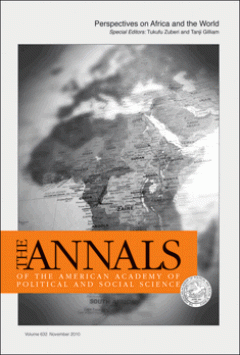
The Ogaden War and the Demise of DĂ©tente
The failure of détente has been a popular theme among historians of American foreign policy, with opinions divided as to where the responsibility for this failure lies. A commonality among all points of view, however, is the importance of events in the third world, particularly in the “Arc of Crisis.” One such event—the Ogaden War between Ethiopia and Somalia— prompted Zbigniew Brzezinski, Pres…
- Edition
- Vol. 632 no. 1, November 2010.pp. 26-40
- ISBN/ISSN
- 00027162
- Collation
- -
- Series Title
- The ANNALS of the American Academy of Political and Social Science
- Call Number
- -
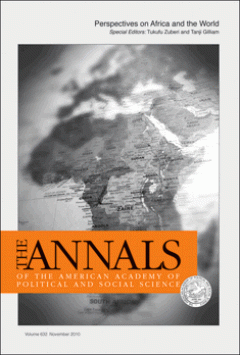
Black Africans in World War II: The Soldiers’ Stories
This article discusses the often forgotten contributions of black African infantry to the French and British war efforts from Europe to Asia during the Second World War. It traces the relationship between black African soldiers and their imperial rulers as it evolved over the course of two global conflicts from 1914 to 1945. The article points out how racist preconceptions about the “inferior” …
- Edition
- Vol. 632 no. 1, November 2010.pp. 12-25
- ISBN/ISSN
- 00027162
- Collation
- -
- Series Title
- The ANNALS of the American Academy of Political and Social Science
- Call Number
- -
 Computer Science, Information & General Works
Computer Science, Information & General Works  Philosophy & Psychology
Philosophy & Psychology  Religion
Religion  Social Sciences
Social Sciences  Language
Language  Pure Science
Pure Science  Applied Sciences
Applied Sciences  Art & Recreation
Art & Recreation  Literature
Literature  History & Geography
History & Geography